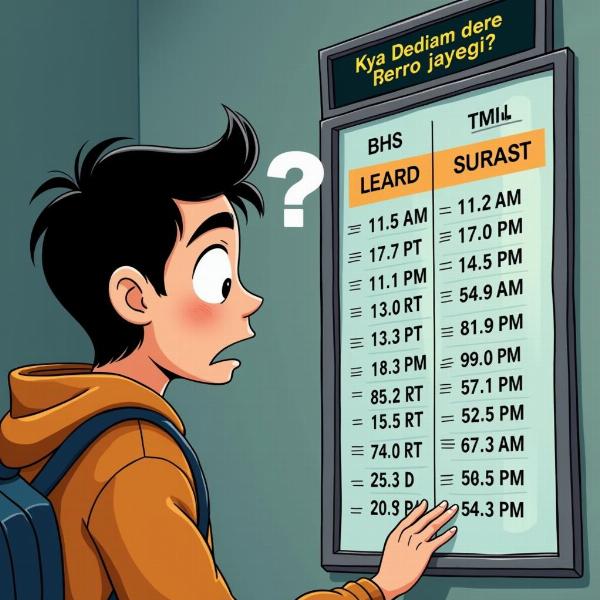Understanding how to express lateness in Hindi is crucial for effective communication, whether you’re navigating daily life or conducting business. “I will be late” carries a simple meaning in English, but conveying the same sentiment in Hindi requires a nuanced approach, considering the context and level of formality. This guide explores various ways to say “I will be late” in Hindi, providing you with the linguistic tools to navigate various social situations.
Different Ways to Say “I Will Be Late” in Hindi
Hindi offers several expressions to convey lateness, each with its own subtle connotations. Choosing the right phrase depends on the context, your relationship with the person you’re speaking to, and the degree of formality required.
- “Mujhe der ho jayegi” (मुझे देर हो जाएगी): This is perhaps the most common and versatile way to say “I will be late.” It’s suitable for most situations and carries a neutral tone.
- “Main der se aaunga/aaungi” (मैं देर से आऊँगा/आऊँगी): This translates to “I will come late.” The masculine form (aaunga) is used by males, while the feminine form (aaungi) is used by females. This phrase is slightly more specific than “mujhe der ho jayegi” as it emphasizes the act of arriving late.
- “Main deri se pahunchunga/pahunchungi” (मैं देरी से पहुँचूँगा/पहुँचूँगी): This translates to “I will arrive late.” Similar to the previous phrase, the masculine form (pahunchunga) is used by males, and the feminine form (pahunchungi) is used by females. This expression is suitable for more formal situations or when discussing arrival at a specific destination.
- “Thodi der ho jayegi” (थोड़ी देर हो जाएगी): This translates to “I will be a little late.” Adding “thodi” (a little) softens the statement and implies a minor delay.
Expressing Reasons for Lateness
Sometimes, simply stating that you’ll be late isn’t enough. Explaining the reason can show consideration and avoid misunderstandings. Here are some ways to express reasons for being late in Hindi:
- “Traffic mein fans gaya/gayi hun” (ट्रैफ़िक में फँस गया/गयी हूँ): “I’m stuck in traffic.”
- “Kuch kaam aa gaya/gayi hai” (कुछ काम आ गया/गयी है): “Something came up.”
- “Bas aane hi wala/wali hun” (बस आने ही वाला/वाली हूँ): “I’m just about to arrive.” This phrase is often used when you are already close to your destination.
Formal vs. Informal Contexts
When speaking to someone older or in a professional setting, it’s important to use respectful language. “Mujhe der ho jayegi” and “Main deri se pahunchunga/pahunchungi” are generally suitable for formal contexts. In informal situations, you can use any of the phrases mentioned above.
Will I Be Late Meaning in Hindi: Understanding the Question
Sometimes, the question isn’t about stating lateness, but asking about the possibility. “Will I be late?” in Hindi can be expressed as:
- “Kya mujhe der ho jayegi?” (क्या मुझे देर हो जाएगी?): This is a straightforward way to ask if you will be late.
- “Kya main der se pahunchunga/pahunchungi?” (क्या मैं देर से पहुँचूँगा/पहुँचूँगी?): This translates to “Will I arrive late?”
 Will I Be Late in Hindi – Checking Time
Will I Be Late in Hindi – Checking Time
Communicating Lateness Effectively
Regardless of the phrase you choose, informing someone about your potential lateness promptly and politely is crucial. This demonstrates respect for their time and helps manage expectations.
Practical Examples
- Scenario: You’re running late for a meeting with your boss. You could say: “Sir, mujhe der ho jayegi. Traffic mein fans gaya hun.” (Sir, I will be late. I am stuck in traffic.)
- Scenario: You’re meeting a friend for lunch. You could say: “Yaar, thodi der ho jayegi. Kuch kaam aa gaya hai.” (Friend, I’ll be a little late. Something came up.)
Conclusion
Effectively communicating lateness in Hindi requires understanding the nuances of different phrases and choosing the right one based on the context. This guide provides you with a range of expressions to navigate various situations, ensuring clear communication and maintaining respectful relationships. By understanding these nuances, you can confidently navigate social and professional interactions, even when time isn’t on your side. Remember, clear communication is key, especially when dealing with time-sensitive matters. “I will be late meaning in hindi” encompasses more than just a single translation—it’s about understanding the cultural context and choosing the appropriate expression.
FAQ
-
What is the most common way to say “I will be late” in Hindi? The most common way is “Mujhe der ho jayegi” (मुझे देर हो जाएगी).
-
How do I say “I will be a little late” in Hindi? You can say “Thodi der ho jayegi” (थोड़ी देर हो जाएगी).
-
Is there a difference between “der” and “deri” in Hindi? Both “der” and “deri” mean lateness, but “deri” is often used in more formal contexts.
-
How do I explain the reason for my lateness in Hindi? You can add phrases like “Traffic mein fans gaya/gayi hun” (stuck in traffic) or “Kuch kaam aa gaya/gayi hai” (something came up).
-
How do I ask “Will I be late?” in Hindi? You can ask “Kya mujhe der ho jayegi?” (क्या मुझे देर हो जाएगी?).
Meaning-Hindi.in is your premier destination for professional Hindi translation services. We specialize in a wide range of translation needs, from business and legal documents to technical manuals and website localization. Our team of expert linguists ensures accurate and culturally sensitive translations, tailored to your specific requirements. Whether you need to translate date wise meaning in hindi, how to possible meaning in hindi, or understand the nuances of askim meaning in hindi, our team is here to help. We also offer specialized services like what is the meaning of manish in hindi and plop meaning in hindi. Contact us today at [email protected] or call us at +91 11-4502-7584 to discuss your translation needs. Meaning-Hindi.in is your trusted partner for all your Hindi language solutions.